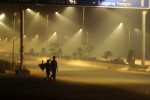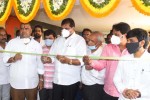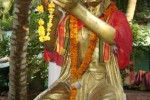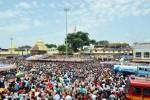 Odisha Channel Bureau New Delhi, Mar 13: The National Human Rights Commission has not accepted the contention of the Odisha Government, which, setting aside the recommendations of a judicial commission set up by it, decided not to pay any compensation to the next of kin of 40 persons who died after consuming contaminated medicinal preparations containing alcohol in parts of Cuttack and Khurda districts during February, 2012.Reiterating its earlier stand for payment of relief of Rs.1.5 lakh to the next of kin of each deceased, as also recommended by the Justice Naidu Commission, the NHRC rejected the stand of the State Government and has asked its Chief Secretary to send a compliance report along with proof of payment of monetary relief within six weeks, which is still awaited.The Justice Naidu Commission, after enquiry, had observed that “all the 41 persons, who lost their lives, belong to the lower echelon of the society. They are daily labourers and perform strenuous work.Considering their ability, generally they prefer intoxicants which are cheaper and stronger. The duty of the State, if it does not support on prohibition, is to assure such privilege.It appears that the State machinery has failed to do so and the untoward incident occurred due to negligence or lackadaisical attitude of the officers of the local administration. In view of the aforesaid position, the Commission feels it would be just and proper to award a compensation of Rs.1.50 lakhs to the widow and dependents of each deceased persons who succumbed after consuming contaminated medicinal preparation.”The judicial commission did not recommend monetary relief for the dependents of one person, who also died due to consumption of contaminated medicinal preparations, as he was one of the illicit vendors of the liquor.Taking the observations of the judicial commission further, NHRC Member Justice D.Murugesan observed that the enjoyment of the basic human rights is the entitlement of every citizen and their protection is the obligation of every civilized State. The Commission further observed that since it failed to do so in this case and the negligence of its officers caused the unfortunate death of human beings, pecuniary compensation is an effective and suitable remedy for redressal of the established infringement of the fundamental right to life of a citizen by the public servants and the State is vicariously liable for their acts.The Commission took the cognisance of a complaint, received on the 3rd March, 2012, accompanying a newspaper report dated the 9th February, 2012 from a human rights activist of Varanasi, Uttar Pradesh and on the 30th March, 2012 called reports from the concerned authorities.Subsequent to this and several other reminders and notices, it was informed that on the 29th August, 2012, the State Government had appointed a Commission of Enquiry, headed by Justice A.S.Naidu, a retired Judge of High Court, to establish the cause of incident and recommend various steps to avoid recurrence of such incidents. The report of Commission of Enquiry was received vide a communication dated 1st August, 2014 from the State Government.The Commission, based on its consideration of the report, agreed with the observations of Justice Naidu Commission and on the 8th September, 2014, issued a show cause notice to the State Government why monetary relief of Rs.1.5 lakh to the next of kin of each deceased should not be paid.However, on the 8th December, 2014, the State Government informed that the Cabinet deliberated upon the issue at a meeting on the 17th July, 2014 and decided that in consonance with the previous practice, the compensation should not be given.
Odisha Channel Bureau New Delhi, Mar 13: The National Human Rights Commission has not accepted the contention of the Odisha Government, which, setting aside the recommendations of a judicial commission set up by it, decided not to pay any compensation to the next of kin of 40 persons who died after consuming contaminated medicinal preparations containing alcohol in parts of Cuttack and Khurda districts during February, 2012.Reiterating its earlier stand for payment of relief of Rs.1.5 lakh to the next of kin of each deceased, as also recommended by the Justice Naidu Commission, the NHRC rejected the stand of the State Government and has asked its Chief Secretary to send a compliance report along with proof of payment of monetary relief within six weeks, which is still awaited.The Justice Naidu Commission, after enquiry, had observed that “all the 41 persons, who lost their lives, belong to the lower echelon of the society. They are daily labourers and perform strenuous work.Considering their ability, generally they prefer intoxicants which are cheaper and stronger. The duty of the State, if it does not support on prohibition, is to assure such privilege.It appears that the State machinery has failed to do so and the untoward incident occurred due to negligence or lackadaisical attitude of the officers of the local administration. In view of the aforesaid position, the Commission feels it would be just and proper to award a compensation of Rs.1.50 lakhs to the widow and dependents of each deceased persons who succumbed after consuming contaminated medicinal preparation.”The judicial commission did not recommend monetary relief for the dependents of one person, who also died due to consumption of contaminated medicinal preparations, as he was one of the illicit vendors of the liquor.Taking the observations of the judicial commission further, NHRC Member Justice D.Murugesan observed that the enjoyment of the basic human rights is the entitlement of every citizen and their protection is the obligation of every civilized State. The Commission further observed that since it failed to do so in this case and the negligence of its officers caused the unfortunate death of human beings, pecuniary compensation is an effective and suitable remedy for redressal of the established infringement of the fundamental right to life of a citizen by the public servants and the State is vicariously liable for their acts.The Commission took the cognisance of a complaint, received on the 3rd March, 2012, accompanying a newspaper report dated the 9th February, 2012 from a human rights activist of Varanasi, Uttar Pradesh and on the 30th March, 2012 called reports from the concerned authorities.Subsequent to this and several other reminders and notices, it was informed that on the 29th August, 2012, the State Government had appointed a Commission of Enquiry, headed by Justice A.S.Naidu, a retired Judge of High Court, to establish the cause of incident and recommend various steps to avoid recurrence of such incidents. The report of Commission of Enquiry was received vide a communication dated 1st August, 2014 from the State Government.The Commission, based on its consideration of the report, agreed with the observations of Justice Naidu Commission and on the 8th September, 2014, issued a show cause notice to the State Government why monetary relief of Rs.1.5 lakh to the next of kin of each deceased should not be paid.However, on the 8th December, 2014, the State Government informed that the Cabinet deliberated upon the issue at a meeting on the 17th July, 2014 and decided that in consonance with the previous practice, the compensation should not be given.
March 13, 2015
March 13, 2015
0 Comment
Related Articles:
- 5T Secretary reviews progress on CMO district visit grievance redressal
September 13, 2023, 11:47 am
- Patnaik announces Rs 10 lakhs each to Asian Game qualified Odisha athletes
September 13, 2023, 8:13 am
- Odisha CMO reviews grievances related to industrial development
September 12, 2023, 1:10 pm
- Odisha accelerates economic growth with approval of 9 key industrial projects
September 12, 2023, 4:02 am
- Odisha government is committed to welfare of animals: Patnaik
September 8, 2023, 4:18 pm
- Naveen Patnaik felicitates visually-challenged cricket players
September 8, 2023, 2:59 pm
- Odisha panchayat polls: Landslide victory for BJD, BJP distant second
March 1, 2022, 12:33 pm
- Hemananda Biswal: An inspiration for tribal leaders of Odisha
February 26, 2022, 5:17 am
- Hemananda Biswal passes away, to be cremated at his native place
February 26, 2022, 5:10 am
- Urban civic polls in Odisha to be held on March 24
February 25, 2022, 6:03 pm
Breaking News:
- My daughter repeated kindergarten because she couldn't read. I ended up sending both my kids to private school because I don't trust the public system.
December 21, 2024, 10:12 am - Senate passes Social Security benefits boost for many public service retirees
December 21, 2024, 1:48 am - Homeowner ends up in jail after calling police to remove squatter living inside her house
December 21, 2024, 12:46 am - New damage delays I-40 reopening in North Carolina closed by Helene
December 21, 2024, 12:34 am - ‘This stops now’: DC mother speaks out after teacher posts video of her son with offensive caption
December 21, 2024, 12:00 am - NTSB trying to determine why tractor-trailer stopped on train tracks before deadly West Texas crash
December 20, 2024, 11:53 pm - What we know about the suspect in deadly car crash at German Christmas market
December 20, 2024, 10:35 pm - Oregon sheriff concerned about letters asking people to track possible immigrants
December 20, 2024, 10:13 pm - Feds: Taco restaurant owner ordered to pay $823K in back wages, damages
December 20, 2024, 9:58 pm - IRS sending up to $1,400 to 1 million people. Here's who qualifies.
December 20, 2024, 9:52 pm

















